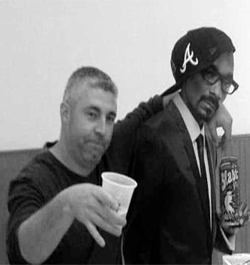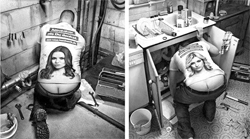Town of Niagara Lawmaker Reluctant to Pay His Water Bill
By Frank Parlato
Rob Clark is a Town of Niagara Councilmember who just can't seem to pay his town water bill.
Not just once, but every year.
Since 2007, the two-term councilman has chosen to allow his water bill to go unpaid, forcing the town to bill the county where they convert it to the unpaid tax roll.
Oddly, while not paying his own water bills, Clark has nonetheless voted for water rate increases including one in 2011 raising the rates by $5 per quarter.
Towns in New York do not have the legal authority to foreclose on property for unpaid taxes or water and sewer charges.
In the Town of Niagara, when people do not pay their water bills, the town does not disconnect service, but transfers the debt to the county and the county reimburses the town the following year.
This has led many townsfolk in Niagara to not pay their water bills and instead lumped into their tax bill the following year, which serves to delay making the payment by one to three years.
The trouble with this is that the town is always behind and this creates the need to raise water rates.
"Even though you get your money the next year (from the county) it is the same group of people who do not pay and so you once again are short, and looking for a reimbursement, " said Town Supervisor Steve Richards. "You always have a shortfall."
The total town water billing is around $650,000.
Unpaid water and sewer bills from townsfolk like Clark were $139,898.17.
Clarks average stiff of the town ranges from $175 to more than $400 per year.
When Supervisor Richards first took office, he made a lot of changes to the way the town does business. He cut taxes and cut overhead and, amazingly enough, in this age of more government, this supervisor slashed water rates for seniors and small users.
He did this by lowering minimum rates and requiring big water users like the Fashion Outlet Mall to pay at the same rate as the little guy.
The town used to discount water for big users. The more they used, the less they paid per gallon.
Richards figured that "water is water" and that instead of giving the big users a volume discount and making them pay a fair rate for water - he could lower the rate for the seniors and average small users.
Richards brought the rates down for basic residential users from approximately $150 per year to $60 a year by this simple move, saving the seniors and small users around $100 per year.
Now stop for a minute and realize what this man did.
He didn't not take the campaign contribution from the big users, (in fact Richards does not take any campaign donations from anyone). He was oblivious to their lobbyists and he slashed water rates.
Compare that to the shenanigans going on at the Niagara Falls Water Board.
But, even in Niagara, where an honest man like Richards seems to be from some golden, honesty-first era of the past, there are guys like Clark and others who realize that since the town will never shut off their water, they can make their rates even lower for themselves by not paying the town for water and sticking the bill on the county.
Asked how he felt that an elected official like Clark does not pay his water bills, Supervisor Richards said, "I am embarrassed for the Town of Niagara. If you go on his Facebook page he has photos of his refrigerator loaded with beer. Picture after picture of him with beer. He has enough money to pay his water bills just on the empty beer bottle returns…. People like him are responsible for the senior citizens getting a $5 raise in their water bill…He is, after all, an elected official."
When contacted by the Reporter, Clark admitted that he hadn't paid "some" water bills. He said he was not certain how much.
Asked if the practice of not paying water bills and having them paid by the county was improper, Clark said, "Is it a good practice? Probably not. Is it something I do on purpose? I don't do it on purpose. I am not going to lay the blame on my wife.
"One way or another they get paid. [When they are delinquent] I pay them out of my mortgage."
Clark was asked if he would pay his water bills in the future.
Clark said, "If I can do it, I do. Like everybody else in this town, I try to get by with what I have. ... I provide a decent amount for my family....If I can pay all my bills on time, I do. ... I don't set out not to pay my water bill. If I have the money, I am going to pay it. Now everybody is going to watch to see if I pay my water bill."
Asked why he could not pay his water bill when his photos on Facebook show hundreds of bottles and cans of beer, Clark said, "I didn't pay for all that beer. I can tell people until I am blue in the face that I did not pay for all that beer, but other people did."
This is not the first time that Clark seemingly said one thing and then did another.
When Clark first ran for office, part of his campaign platform was to end lifetime health insurance benefits for council members.
In fact, the councilman he beat, Lavern Haseley was accepting health insurance from the town.
When Haseley lost and Clark took his seat, there was no board member taking health insurance. It was expected that the first resolution that Clark would propose would be to restrict or eliminate health insurance for council members.
Instead he quietly applied for and got health insurance from the town for himself.
Clark presently is the only council member who gets health insurance from the town, costing the town $19,345.56 per year.
When asked why he accepted health insurance from the taxpayers when he had health insurance at his fulltime job at Niagara Falls Memorial Medical Center, where he works as a security guard, Clark answered, "I was worried that I might lose my job (at Memorial). I was placed on administrative leave because of Steve Richards (arising out of a criminal charge against Clark for stealing campaign signs). I decided it would be safer to take health insurance from the town. My family comes first."
Actually there have been a raft of charges and counter-charges between Clark and Richards, many of them of a highly interesting nature and the probable subject of a future story. However, the record of accomplishment of the two men are starkly different.
Since Richards has become supervisor, he has a record of unblemished excellence and a habit of getting things done that serve the town well.
He negotiated a higher payment from the New York Power Authority Relicensing agreement than the city of Niagara Falls did and remember Niagara Falls is where the power is generated.
Richards built a park with the money instead of blowing it all on patronage positions.
He got the entire town free garbage removal. He kept taxes low; he slashed water rates in half; he created a community center without using taxpayer money.
He gets more from the Fashion Outlet Mall per square foot for the Town of Niagara than Amherst, Cheektowaga or Clarence get for the Eastern Hills Mall, the Boulevard Mall and the Galleria Mall and, better still, he got the owners to donate money to the upkeep of the town park so that the taxpayers do not have to pay for it.
Conversely, one is hard pressed to find a single resolution of substance Clark has offered since becoming a council member in 2007.
Funny, too, according to Clarks' pension statement on file in the town of Niagara, he shows he puts in the least hours of any council member, yet he costs the town the most.
Clark's council salary is $12,038. The cost of his medical insurance is $19,345.56. The town contributes another $1,208 for his Social Security and FICA taxes per year.
Clark costs the town $32,592.41 or $2,716.03 per month.
Clark claims in his official New York State Pension System mandatory calendar that he worked 28.75 hours per month as a council member.
A similar look at the other council members shows they all work much more than Clark and since none of them get health insurance, their cost to the town is under $14,000.
The Reporter calculated, based on their cost to the town and what each of the four council members' pension reports say are the hours they work, what each of them cost the town per hour they work on town business
Marc Carpenter, who works more than 100 hours per month doing town business, cost the town $9.86 per hour.
Danny Sklarksi, the deputy supervisor, averages $11.26 per hour.
Charles Teixeira, who also serves as the police commissioner, costs the town $10.90 per hour.
And Robert Clark costs the town $94.47 per hour.
So how come he can't pay his water bill?



